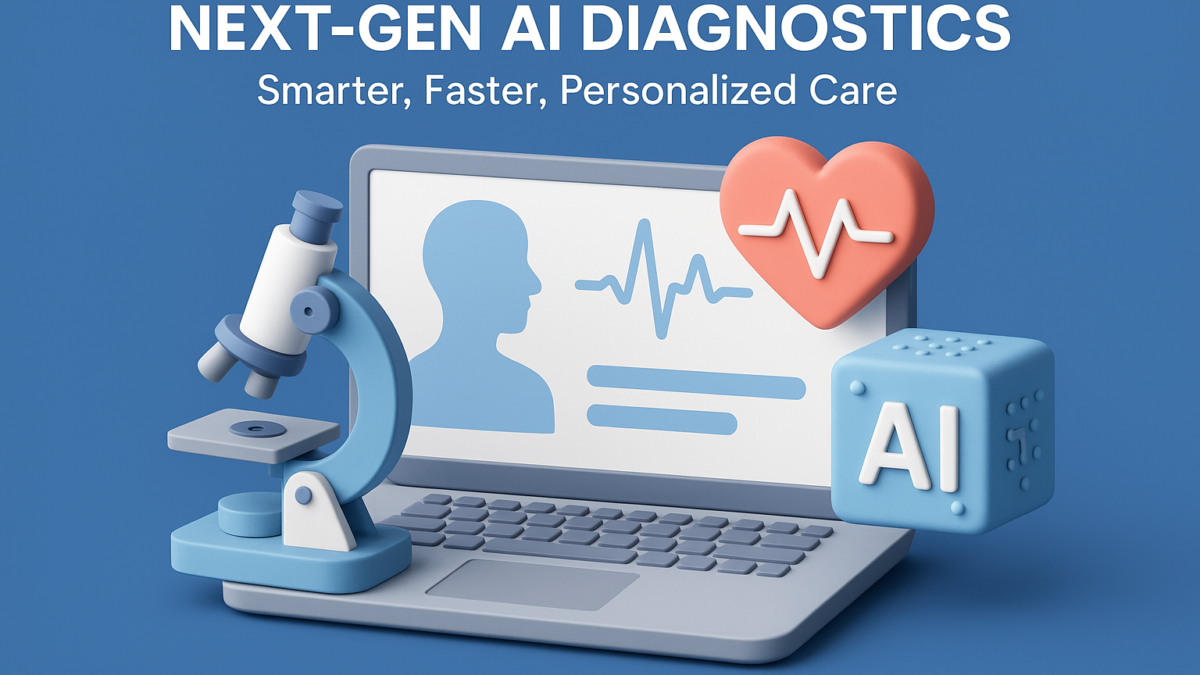Next-Gen AI Diagnostics: Smarter, Faster, Personalized Care
Table of Contents
Introduction
The healthcare landscape is undergoing a significant transformation, driven by advancements in artificial intelligence (AI). From medical imaging to predictive analytics, AI is enabling faster, more accurate, and personalized diagnostics, helping healthcare providers make informed decisions while enhancing patient care. This blog explores how next-gen AI diagnostics are revolutionizing modern medicine.
1. AI-Powered Diagnostics: Enhancing Accuracy
AI algorithms can analyze complex medical data such as MRIs, CT scans, and X-rays with remarkable precision. These tools help doctors detect subtle patterns that may be missed by human eyes, enabling early disease detection and more accurate diagnoses.
Key Benefits:
- Reduced misdiagnosis rates.
- Faster analysis of thousands of medical images.
- Real-time decision support for clinicians.
Example: AI models for detecting breast and lung cancers have shown higher accuracy than traditional methods, leading to earlier intervention and improved patient outcomes.
2. Personalized Treatment Plans
AI diagnostics go beyond detection—they help create customized treatment plans tailored to an individual’s genetic profile, lifestyle, and medical history. This precision approach allows physicians to:
- Predict responses to medications.
- Minimize side effects.
- Optimize long-term health outcomes.
Example: AI platforms in oncology assist doctors in designing personalized cancer treatments by analyzing large datasets of patient outcomes and research studies.
3. Faster Diagnoses for Better Outcomes
AI accelerates diagnostic workflows, reducing waiting times and enabling timely interventions.
- Automates data analysis from medical records and lab results.
- Supports quicker triage in emergency settings.
- Frees clinicians to focus on patient care instead of administrative tasks.
Example: Hospitals using AI triage systems report up to 40% faster diagnostic turnaround, improving patient satisfaction and outcomes.
4. Integration with Telemedicine and Remote Monitoring
AI diagnostics are transforming telehealth and remote patient monitoring, making healthcare more accessible:
- Wearable devices track vitals and alert doctors to anomalies.
- AI chatbots can provide preliminary symptom checks.
- Patients in remote areas gain access to expert care without traveling.
Example: Telemedicine platforms integrate AI diagnostics to remotely monitor chronic patients, preventing complications before they escalate.
5. Real-World Applications and Success Stories
AI diagnostics are already making an impact in various medical fields:
- Cardiology: Predicting heart disease and preventing heart attacks.
- Neurology: Early detection of neurodegenerative disorders.
- Radiology: Automating image interpretation for faster results.
- Oncology: Early tumor detection with higher accuracy.
Statistics: A 2025 MedTech report predicts global adoption of AI diagnostics will grow by 40% in the next five years, demonstrating their increasing value in healthcare.
Conclusion
Next-gen AI diagnostics are reshaping healthcare, delivering smarter, faster, and personalized solutions. From enhancing accuracy to supporting remote care, AI empowers healthcare providers to make better decisions, improve patient outcomes, and reduce operational inefficiencies.
Amplify your reach and connect with your target audience effortlessly. LeverageiTMunch’s B2B Content Syndication Service to distribute your content across 1,500+ partner platforms, reaching over 1 million professionals globally. Get started today and maximize your content impact!





